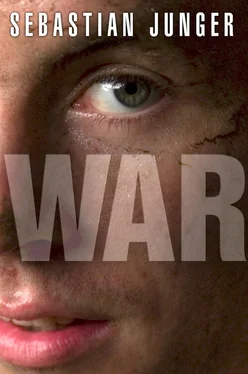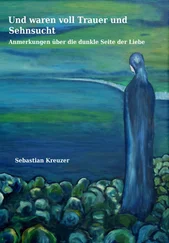I wore a body armor vest like the soldiers did — they called it an “IBA” — and a helmet, which they called a “Kevlar.” Together those weighed around thirty pounds. I had a five-pound video camera, five pounds of water in a CamelBak, and maybe another twenty pounds of food and clothing if we were going out overnight. I could walk all day with fifty or sixty pounds on my back but I couldn’t run more than a hundred yards at a time — no one could — and few people could run uphill more than a few steps. I carried my camera on a strap but it got destroyed swinging into rocks on a nighttime operation, so I hooked the new one onto a carabiner that hung off my left shoulder. That way it swung less and was easier to put my hands on quickly. I had extra batteries and tapes in my vest as well as a medical kit, and on patrols I strapped a CamelBak directly to it so that I could ditch my pack and still be okay. I had my blood type, “O POS,” written on my boots, helmet, and vest, and I had my press pass buttoned into a pants pocket along with a headlamp, a folding knife, and notebook and pens. Everything I needed was on me pretty much all the time.
Patrols on hot days came down to water versus distance: you didn’t want to go dry, but neither did you want to carry ten extra pounds if you were going to have to run anywhere. I’d try to have drunk three-quarters of my water by the turnaround point of a patrol, and then at the bottom of the steep climb to Restrepo I’d sip at it steadily so I was light and hydrated when we were most likely to get hit. I’d find myself doing a body check all the way up: “Legs okay, breathing labored, mouth dry but not too bad,” various internal levels that had been calibrated during races in college and never forgotten. (It didn’t matter how badly off I was as long as some other soldier was worse; I just didn’t want to be the one holding things up.) I never went on a patrol that hurt more than an even moderately hard college race, and I’ve never run a race that held anything close to the implications of the most mundane task a hundred meters outside the wire.
Giving in to fear or exhaustion were the ways in which a soldier could fail his platoon, but there were ways a reporter could screw things up as well. Tim broke his ankle on a nighttime operation on the Abas Ghar, but the medic told him it was only sprained so that, mentally, Tim would think he could walk on it. And he did. There was no other way to get him out of there, and if the platoon were still on the mountain at dawn they were going to get hammered. He walked all night on a fractured fibula with only Motrin as a painkiller, and they didn’t tell him it was broken until he got to the KOP. They put a steel plate and a bunch of screws into his leg and a few months later he was back in business.
Several years earlier in Zabul I had asked the battalion commander how discreet I had to be on my satellite phone when calling home, and he just said, “Big-boy rules, I hope I don’t have to explain what that means.” Tim was playing by big-boy rules up there, which essentially means making your interests secondary to those of the group no matter how much it costs you.
“There are guys in the platoon who straight up hate each other,” O’Byrne told me one morning. We were sitting in ambush above the village of Bandeleek listening to mortars shriek over our heads, and there wasn’t much to do but flinch and talk about the platoon. “But they would also die for each other. So you kind of have to ask, ‘How much could I really hate the guy?’”
Around midmorning a squad of Scouts comes walking in through the wire, uniforms plastered to their bodies and sweat running off the ends of their noses. Second Platoon has been hacking away at the hillside all morning and the men pause at their shovels and pickaxes to greet them. Guttie was MEDEVACed last night without incident and it has been quiet all morning, which may simply mean the enemy is out of ammunition. The Scouts have a different vibe from the regular line soldiers, leaner and quieter, and they seem to carry a little less gear. Their job is to patrol beyond anywhere line infantry would go and then report back what they see. Sometimes they’ll set in for days at a time and just watch. They’re not supposed to get into firefights, and when they do engage, it’s often just a single shot from a sniper rifle.
The squad leader is a short, strong-looking man with dark eyes and jet-black hair named Larry Rougle. Rougle has done six combat tours in six years and is known in Battle Company as a legendary badass and some kind of ultimate soldier. Once Phoenix got hit and Rougle and his men grabbed their weapons at the KOP and ran down there so fast that Piosa was still on the radio calling in the attack when they walked in the wire. You couldn’t even get there that fast in a Humvee. Rougle talks to Piosa in the bunker while his men pour bottled water down their throats and half an hour later they form up and Tim and I grab our packs and follow them out of the wire. We contour around the draw until we reach OP 1, which sits on a promontory west of the KOP. It’s only manned by four men at a time and it’s almost impossible to attack, so there’s nothing for the men to do up there but wave away the flies and think about how many months they have left. When we arrive Rougle stands on a bunker and looks eastward toward the Abas Ghar.
“Everything you can see,” he says to me, “I’ve walked on.”
DAWN AT THE KOP: ONE LAST PLANET LIKE A PINHOLE in the sky, crows rising on the valley thermals. The sun about to crack open the day from beyond the Abas Ghar. I’m sitting on the broken office chair outside the hooch waiting to see what will happen. Kearney has ordered stand-to at zero hundred hours — 4:30 a.m. local — because there’s intel the enemy may attack the KOP and try to breach the wire. Men are shuffling around, fumbling for their weapons. Stand-to means you get dressed and geared up and if you don’t get attacked you can go back to sleep. The men sleep as much as they can, every chance they get, far beyond the needs of the human body. “If you sleep twelve hours a day it’s only a seven-month deployment,” one soldier explained.
The day broadens and no attack comes. I walk up to the operations center to talk to Kearney, who is half asleep at his desk. Third Platoon will be going onto the Abas Ghar in a couple of days and Tim and I are going with them. (Jones: “Personally, I wouldn’t follow them into a Dairy Queen.”) Around midafternoon a sniper on the ridge above Restrepo starts shooting into the KOP; it’s not the attack that was expected but it’s enough to get everyone’s attention. When the men move around the base they sprint the open sections until, ka-SHAAH , another round cracks past and they stop behind a Hesco. (Soldiers spend a good deal of time trying to figure out how to reproduce the sound of gunfire verbally, and “ka-SHAAH” was the word Second Platoon seemed to have settled on.) I’m sitting in the broken office chair outside the hooch, which has pretty good cover, watching Tim make his way to the burn-shitters. He runs to a tree, lurks there for a moment, and then runs to the next tree. If you didn’t know about the sniper you’d think he was doing some comic routine of an Englishman gone completely mad in the noonday sun.
Snipers have the power to make even silence unnerving, so their effectiveness is way out of proportion to the number of rounds they shoot. The KOP’s mortars eventually start up, great explosions that crash through the base and then rumble back to us from the mountaintops. They may have killed the guy, but I doubt it, and in the end it doesn’t even matter; it’s just one man with a rifle and ten dollars’ worth of ammunition. He doesn’t even need to hit anyone to be effective: helicopters aren’t flying into the valley and thirty or forty men spend the afternoon behind sandbags trying to figure out whether they’re getting shot at by a Russian-made Dragunov or an old Enfield .308. Once I was at the operations center when single shots started coming in, and First Sergeant Caldwell headed for the door to deal with it. On his way out I asked him what was going on. “Some jackass wastin’ our time,” he said.
Читать дальше
Конец ознакомительного отрывка
Купить книгу












